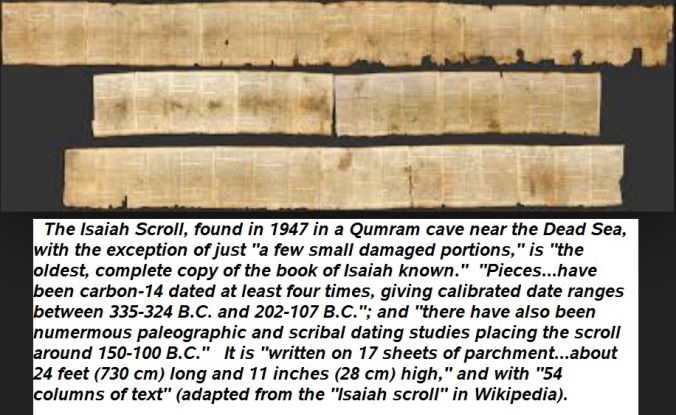“Go therefore and make disciples of all the nations…teaching them to observe all that I commanded you; and lo, I am with you always, even to the end of the age” (Matthew 28:19-20, NASB).
——————
Contents:
1) Who Are the “Captives” of Ephesians 4:8? (Tom Edwards)
——————–

-1-
Who Are the “Captives” of Ephesians 4:8?
Tom Edwards
In the above passage, Paul states, “There it says, ‘WHEN HE ASCENDED ON HIGH, HE LED CAPTIVE A HOST OF CAPTIVES, AND HE GAVE GIFTS TO MEN.’”
But just who were these who were led captive?
Though some people view this as pertaining to those who had formerly been in bondage to Satan and sin, but were now set free by Christ, it appears to rather be speaking of not the redeemed, but of those who are the conquered enemies of the Lord.
So though it is true that Christ came to this world “to proclaim release to the captives” (Luke 4:18) — that release is for just those who will submit their lives to the Lord. For if we do not, we will remain in bondage.
In the Bible in Basic English and the Contemporary English Version, these captives are referred to as “prisoners.” And also in the Holman Christian Standard Bible, which words it as, “…He took prisoners into captivity….”
That certainly doesn’t sound like a deliverance in being set free; but, instead, an imprisonment.
The language, especially in the New International Version, is reminiscent of the long-ago custom by triumphant armies to victoriously return from the battle with a train of chained prisoners following behind them, and, thus, manifesting the enemies’ defeat and the victors’ triumph. The NIV uses this term “train” in our passage under consideration, by saying, “When he ascended on high, he led captives in his train….”
In the song of Deborah and Barak, it is said, “Awake, awake, Deborah; Awake, awake, sing a song! Arise, Barak, and take away your captives, O son of Ahinoam” (Judges 5:12, emphasis mine). As Adam Clarke writes, “the conqueror was placed in a very elevated chariot. … The conquered kings and generals were usually bound behind the chariot of the conqueror, to grace the triumph.” Tacitus writes of the capture of Caratacus as “an incident as glorious as the exhibition to the Roman people of Syphax by Publius Scipio, or Perseus by Lucius Paulus, of other manacled kings by other generals” (annals, XII, 38, emphasis mine).
Part of this ancient custom of the train of chained prisoners following their conquerors in procession is said to have also involved the giving of gifts, which was the plunder taken from the enemy and now distributed to the triumphant army and their people, after returning from the victory.
So the language pertaining to Christ in the above passage appears to be an allusion toward that ancient military custom. And the “booty” He gave are the gifts mentioned just three verses down, where Paul states, “And He gave some as apostles, and some as prophets, and some as evangelists, and some as pastors and teachers, for the equipping of the saints for the work of service, to the building up of the body of Christ” (Eph. 4:11,12).
How needful these “gifts” were to the early church to be led in the way of truth, while the gospel was still being revealed, part by part; and men, at that time, were seeing as if only “in a mirror dimly” (which was just polished metal in those days), since the completed New Testament, which would enable them to see clearly, as if “face to face,” was not yet all revealed (cf. 1 Cor. 13:8-12 — “the perfect” is the gospel in its entirety).
And did not Jesus have to first conquer Satan, sin, and death before those “gifts” could truly be given? For though the apostles were apostles even prior to the Lord’s ascension, yet at that previous time they were lacking in knowledge and power. Therefore, Jesus said to them, with regard to the promise of the Holy Spirit, “I have many more things to say to you, but you cannot bear them now. But when He, the Spirit of truth, comes, He will guide you into all the truth; for He will not speak on His own initiative, but whatever He hears, He will speak; and He will disclose to you what is to come” (John 16:12,13, NASB). This is why, following His resurrection and prior to His ascension, Jesus “commanded” His apostles “…not to leave Jerusalem, but to wait for what the Father had promised, ‘Which,’ He said, ‘you heard of from Me; for John baptized with water, but you will be baptized with the Holy Spirit not many days from now’” (Acts 1:4,5).
This is also why, in comforting the apostles about His soon departure, Jesus told them that “…It is to your advantage that I go away; for if I do not go away, the Helper will not come to you; but if I go, I will send him to you” (Jn. 16:7).
The “Helper” is the Holy Spirit (Jn. 14:16-17,26; Jn. 15:26,27; 16:7-15), whom the apostles received on the day of Pentecost (Acts 2), ten days after the Lord’s ascension (Acts 1:4,5, 9-11). So the Holy Spirit was that “power from on high” (Luke 24:49) that they were to receive in Jerusalem, in order to be effectual witnesses of Christ, empowered and led by the Holy Spirit and enabled to work miraculous signs to confirm the divinely inspired word of which they proclaimed (cf. Mark 16:20; Acts 4:9,10; 2 Cor. 12:12).
The very fact that the Holy Spirit was outpoured on the apostles in Jerusalem, and made evident by their speaking in tongues (Acts 2), is also an indication that Christ truly did ascend back to God’s right hand in the glories of heaven to fulfill that promise! For it was also at that time of His arrival that he received “dominion, glory, and a kingdom” (Dan. 7:13).
In Acts 1:9-11, the apostles saw the Lord ascend into a cloud that went toward heaven; but Daniel’s prophecy in Daniel 7:13,14 is from the perspective of heaven, and seeing Jesus COMING UP “with the clouds of heaven…to the Ancient of Days and was presented before Him” (NASB, emphasis mine).
Ephesians 4:8 is suggestive of Psalm 68:18, which is spoken of as being a triumphal psalm. Paul is using it to indicate the Lord’s triumph over sin, over death, and over all the dark forces of wickedness.
By his life, death, resurrection, and ascension, Jesus triumphed over all his enemies; and that is what Ephesians 4:8 is expressing with the phrase “he led captives in his train.” Corresponding with this, Colossians 2:15 states, “When He had disarmed the rulers and authorities, He made a public display of them, having triumphed over them through Him.”
Though Christ had come to “preach the gospel to the poor…” and “to proclaim release to the captives,” the “captives” of Ephesians 4:8 are not the redeemed. Rather, they are the enemies of the Lord whom He has taken “captive” and made “prisoners” out of. Vincent Word Studies refers to these “prisoners” as being “Satan, Sin, and Death.”
Destroying the works of the devil was one of the reasons why Jesus came to earth. As John writes, “the one who practices sin is of the devil; for the devil has sinned from the beginning. The Son of God appeared for this purpose, to destroy the works of the devil” (1 John 3:8, NASB). To accomplish this, the Lord had to become flesh so that He could be put to death and, thus, make an atonement by that death for every sinner. The Hebrew writer states, “But we do see Him who was made for a little while lower than the angels, namely, Jesus, because of the suffering of death crowned with glory and honor, so that by the grace of God He might taste death for everyone” (Heb. 2:9).
Christ was not made lower in rank, but simply lower in form by taking on a human body in place of his heavenly one. But, again, this was not only so that He could make that atoning sacrifice on our behalf, but also so that He could take away the power of Satan. As the writer goes on to say, “Therefore since the children share in flesh and blood, He Himself likewise also partook of the same, that through death He might render powerless him who had the power of death, that is, the devil, and might free those who through fear of death were subject to slavery all their lives” (vv. 14,15). As Paul also writes, “having canceled out the certificate of debt consisting of decrees against us and which was hostile to us; and He has taken it out of the way, having nailed it to the cross. When He had disarmed the rulers and authorities, He made a public display of them, having triumphed over them through Him” (Col. 2:14,15).
So Jesus had “disarmed” these “rulers and authorities.” In some versions, they are referred to as “the principalities and the powers” (ASV) and “all powers and forces” (CEV). To “destroy the works of the devil,” Jesus had to bind Satan; and that was truly accomplished. As the old preacher used to say, “Satan now has no more power over you than what you give him.” The Bible tells us, “But each one is tempted when he is carried away and enticed by his own lusts” (James 1:14); and James goes on to show the remedy in James 4:7: “Submit therefore to God. Resist the devil, and he will flee from you.”
In Mark 3:27, Jesus says, “But no one can enter the strong man’s house and plunder his property unless he first binds the strong man, and then he will plunder his house.” The Lord said this after being wrongfully accused of being possessed by Beelzebub and casting out demons by the ruler of the demons. Jesus then declared, “How can Satan cast out Satan? If a kingdom is divided against itself, that kingdom cannot stand. … If Satan has risen up against himself and is divided, he cannot stand, but he is finished!” (vv. 23-26). But it was the Lord who out-powered the “strong man” (Satan) and brought him down, making him powerless.
The phrase, “led captive” (Eph. 4:8) is from just one Greek word (“aichmaloteuo”), which, according to Robertson Word Pictures, means “captive in war.”
The phrase “a host of captives” (in the same verse) is also from just one Greek word (“aichmalosia”) and is used in just one other place in the Bible: “If anyone is destined to captivity, to captivity he goes…” (Rev. 13:10).
Jesus truly did ascend to glory, as we just saw in the prophecy of Daniel 7:13,14, and where He was also made “King of kings and Lord of lords” (Rev. 19:16). His dominion is over all (Matt. 28:18). Paul declares, “which He brought about in Christ, when He raised Him from the dead and seated Him at His right hand in the heavenly places, far above all rule and authority and power and dominion, and every name that is named, not only in this age but also in the one to come. And He put all things in subjection under His feet, and gave Him as head over all things to the church, which is His body, the fullness of Him who fills all in all” (Eph. 1:20-23).
Jesus triumphed over Satan, over sin, and over death. By His conquering of these, and, in a manner of speaking, leading them away as His captives, we can now have the victory of Christ’s accomplishment, so that we are no longer under the power of evil, when we submit to God’s plan of salvation and strive to live faithfully, in fellowship with the Lord. For as Paul declares: “Who will separate us from the love of Christ? Will tribulation, or distress, or persecution, or famine, or nakedness, or peril, or sword? Just as it is written, ‘FOR YOUR SAKE WE ARE BEING PUT TO DEATH ALL DAY LONG; WE WERE CONSIDERED AS SHEEP TO BE SLAUGHTERED.’ But in all these things we overwhelmingly conquer through Him who loved us. For I am convinced that neither death, nor life, nor angels, nor principalities, nor things present, nor things to come, nor powers, nor height, nor depth, nor any other created thing, will be able to separate us from the love of God, which is in Christ Jesus our Lord” (Rom. 8:35-39).
Jesus fully obeyed His Father and triumphed over all evil; and because of that, we can now also have the victory in Him if we truly do hear His word and follow (cf. John 10:27-29)!
——————–
The Steps That Lead to Eternal Salvation
1) Hear the gospel, for that is how faith comes (Rom. 10:17; John 20:30,31).
2) Believe in the deity of Christ (John 8:24; John 3:18).
3) Repent of sins (Luke 13:5; Acts 17:30).
4) Confess faith in Christ (Rom. 10:9,10; Acts 8:36-38).
5) Be baptized in water for the remission of sins (Mark 16:16; Acts 2:38; 22:16; Rom. 6:3,4; Gal. 3:26,27; 1 Pet. 3:21).
6) Continue in the faith, living for the Lord; for, if not, salvation can be lost (Heb. 10:36-39; Rev. 2:10; 2 Pet. 2:20-22).
——————–
Tebeau Street
CHURCH OF CHRIST
1402 Tebeau Street, Waycross, GA 31501
Sunday services: 9:00 AM (Bible class); 10 AM & 5 PM (worship)
Wednesday: 7 PM (Bible class)
evangelist/editor: Tom Edwards (912) 281-9917
Tom@ThomasTEdwards.com
http://thomastedwards.com/go (Older version of Gospel Observer website without pictures, but back to March 1990)
http://tebeaustreetchurchofchrist.org/
http://ThomasTEdwards.com/audioser.html (audio sermons)



















